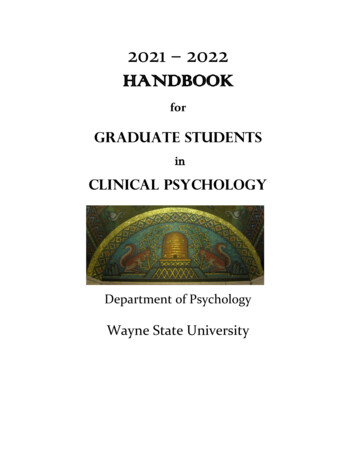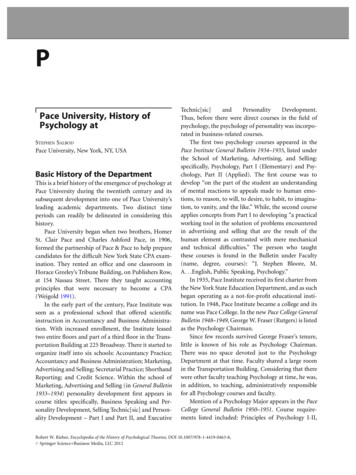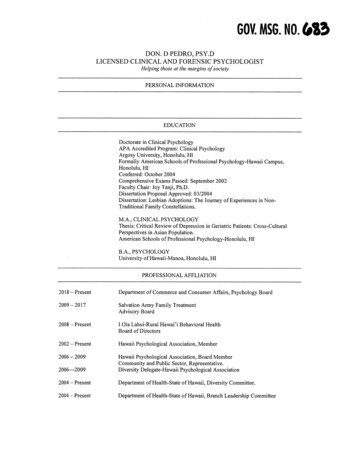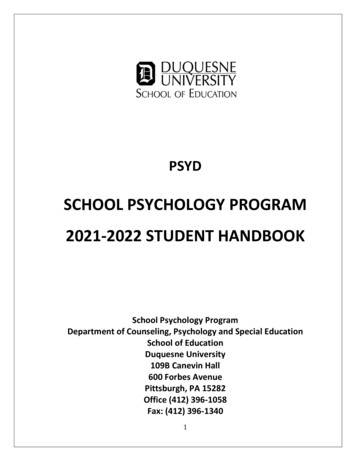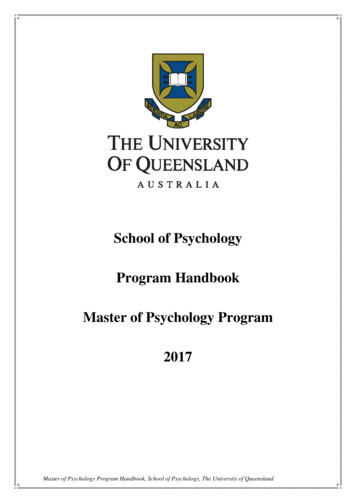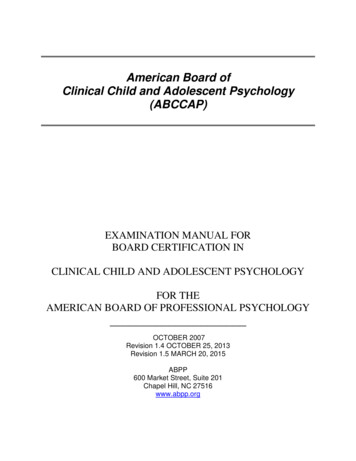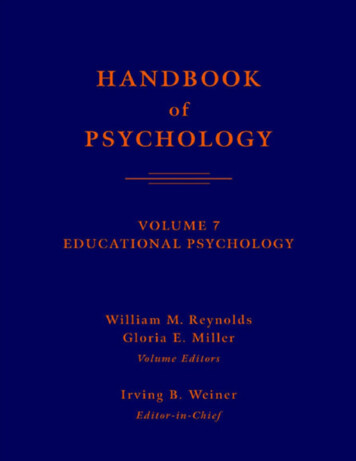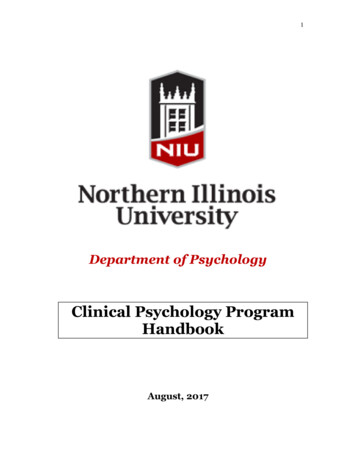
Transcription
1Department of PsychologyClinical Psychology ProgramHandbookAugust, 2017
2Table of ContentsIntroduction . .4Overview of the Program . 4Educational Philosophy and Training Model . 5Psychology Department 6The University and the Community 7Admission Requirements and Procedures . 7Department and University Assistantship Support 8Ph.D. Program Requirements . 10Pre-Internship Clinical Training 19Ongoing Student Activities and Involvement 21Academic Integrity . 23Student Assessment . 24Grievance Procedures . 27Student Support Services 28Self-Care . 28Administrative Procedures . 29Program and Department Faculty . 34APPENDIX A: Costs Associated With Program . 46APPENDIX B: Child Clinical-Developmental Psychopathology Focus . 48APPENDIX C: Trauma Psychology Focus 50APPENDIX D: NIU Clinical Competencies Evaluation .52APPENDIX E: Clinical Area “At Risk” Policy .57
3APPENDIX F: Clinical Candidacy Exams 61APPENDIX G: Council of University Directors of Clinical Psychology MinimalRequirements for Internship Eligibility 63APPENDIX H: Internship Checklist . 64APPENDIX I: NIU Clinical Psychology Program Yearly Evaluation Form. 67APPENDIX J: Community and Campus Resources 69
4IntroductionThe purpose of this Handbook is to provide clinical psychology students with informationabout the procedures, regulations, and requirements for completing the doctoral degree inthe Department of Psychology. When used with other departmental and universityliterature (e.g., Graduate Student Manual, Graduate School Catalog), this Handbook isdesigned to facilitate your progress through the program. It is important, therefore, thatyou read all sections of the Handbook so that you are thoroughly familiar with theprogram and department.If you have any questions regarding the program, department, or university, pleasecontact your faculty mentor or the Director of Clinical Training (DCT). We hope thatyour educational career at Northern Illinois University (NIU) is exciting, challenging, andeducationally profitable.Overview of the ProgramThe area of graduate study in clinical psychology is designed to be completed in 6 yearsof full-time study, including a one-year internship. Part-time applicants are not accepted.Thirty semester hours beyond the baccalaureate degree must be taken for the master’sdegree. Of these, 15 hours will consist of basic courses, 6 hours will be thesis credit, andthe additional hours are made up of elective courses. For the doctoral program, theuniversity requires 90 semester hours beyond the baccalaureate degree, including at least18 hours of dissertation credit. The program requires each student to complete at least 3academic years of full-time graduate study at NIU and a 12-month internship prior toawarding the doctoral degree.The clinical psychology program at NIU first received full American PsychologicalAssociation (APA) accreditation in 1972. We completed our most recent accreditationcycle in 2011 and received full accreditation; our next accreditation site-visit will occurin 2018. Any questions regarding the accreditation of the program should be addressed tothe Office of Program Consultation and Accreditation of the American PsychologicalAssociation; Address: 750 First St. NE, Washington DC 20002-4242; Phone: 202-3365979.The primary purpose of the program is to train professional psychologists to work inuniversities and colleges, medical settings, government agencies, and clinical practice.The clinical program is a generalist program; however the research interests of the facultyallow students to focus on more specialized areas of clinical psychology, includingdevelopmental psychopathology, anxiety, trauma, and family violence/sexual assault.Graduates of the program are prepared to function in research and teaching professions aswell as multiple practitioner roles that include treatment, assessment, and consultationmodalities.To that end, the training program has established the following aims for students in theclinical psychology program:
5Aim 1: Graduates will have broad knowledge of psychological theory and researchrelevant to work in both clinical and research settings in the scientist-practitionertradition.Aim 2: Graduates will be able to apply scientific methods to answer theoretical andapplied questions.Aim 3: Graduates will be prepared for entry into the practice of clinical psychology.Educational Philosophy and Training ModelThe Department of Psychology offers the Ph.D. degree. The doctoral program places astrong emphasis on the scientist-practitioner model of training. The faculty believes aclinical psychologist is distinguished from other helping professionals by the knowledgeand ability to bring a scientific approach to the study, assessment, and treatment ofhuman behavior. The dual emphasis of the scientist-practitioner model is more importantthan ever in this era of changing roles for clinical psychologists, and it is the aim of theprogram to provide rigorous training in both of these important roles. Completion of thePh.D. program entails training in the basic content areas of scientific psychology as wellas specialized training in the applied areas of clinical psychology. Through theintegration of coursework, practicum, and other program related experiences, thecurriculum provides a synthesis of theory, empirical research, and clinical applications.The scientist role is emphasized throughout the program in multiple ways through aseries of sequenced, cumulative, and integrated experiences and processes. Being housedwithin a comprehensive Ph.D. level Department of Psychology, the clinical psychologyprogram provides its students with rigorous, research-based training not only in the coreareas of clinical psychology, but also in the content areas that provide the psychologicalfoundation for the practice of clinical psychology. Students work closely with facultymentors and advisors on the completion of a Master’s thesis and Ph.D. dissertation thatmake a substantial contribution to scientific knowledge. Less formally, studentsparticipate in multiple activities throughout the academic year that directly facilitate andmodel the scientist role. These include participation in ongoing faculty research projects,participation as both attendees and presenters at a variety of departmental colloquiumseries (e.g., Child Brown Bags, Center for the Study of Family Violence Meetings,Anxiety Research Topics Meetings), as well as participation in local, state, and nationalconferences and workshops.Training in the practitioner role emphasizes the development of skills in assessment,intervention, and consultation and the importance of evaluating the methods we use inpractice. As beginning practitioners, students are encouraged to utilize empiricallysupported clinical methods and to conceptualize clinical work within the framework ofempirically supported theories. Clinical training is sequential and cumulative and isintegrated with coursework and research throughout the program. Initial practicumtraining takes place in the departmental Psychological Services Center (PSC), where
6students are supervised by clinical faculty members who help students integratecoursework, research experience, and professional practice. After students complete theirbasic clinical training in the PSC, they complete at least one 9-12 month externship in aclinical setting prior to applying for internship. Toward the end of their training, studentsenroll in a course covering models of supervision and consultation and are afforded theopportunity to supervise beginning students under faculty supervision.In accordance with the scientist-practitioner model, students are continuously encouragedto integrate research and practice in their professional conduct. Our program attractsstudents with a variety of career aspirations in research, practice, and teaching; and thescientist-practitioner model allows our students to obtain broad training whilemaintaining a high degree of individual focus consistent with their chosen roles in theprofession. Moreover, the diversity of student career paths and interests promotesdialogue among students and faculty on the integration of science and practice.The clinical psychology program is dedicated to the principles of respect for andunderstanding of cultural and individual diversity throughout all aspects of training.These principles are reflected in nondiscriminatory policies and operating conditions inthe recruitment and retention of students and faculty, coursework, research, mentoring,and practicum experiences. The program tries to meet the needs of all students in asensitive manner, including those who bring diversity to the program through theirgender, ethnicity, or other characteristics.While the doctoral program in psychology is structured with respect to course contentand sequence, the specific courses and training experiences are shaped by ongoingprogram evaluation. To promote student input into this process, students are activelyinvolved in decision-making concerning the clinical area. Students are involved inrecruiting and orienting incoming students, evaluating candidates for positions on theclinical faculty, and providing input to the clinical faculty regarding area revisions.Psychology DepartmentThe Department of Psychology is housed within the College of Liberal Arts and Sciences(CLAS) and consists of four major curricular areas: (a) Cognitive/Instructional,Developmental, School Psychology; (b) Clinical; (c) Neuroscience and Behavior; (d)Social/Industrial-Organizational. The Department is located in a modern building whichprovides ample research, clinical, and office space for faculty and student use. TheDepartment also administers the Psychological Services Center (PSC), an on-site clinicfacility designed to provide both training for departmental students and service to thecommunity. The PSC is equipped with extensive audio and video recording capabilities,observation facilities, and rooms designed for both assessment and intervention.
7The University and the CommunityNIU maintains its 460-acre main campus in the city of DeKalb, Illinois, a community ofapproximately 44,000 persons about 65 miles directly west of Chicago. Of the nearly18,000 students at NIU, approximately 6,000 are pursuing studies at the graduate level.While university housing is open to graduate students if timely applications are made,most graduate students live off campus and many share apartments with other graduatestudents. Housing and living costs are substantial, but generally less than largermetropolitan centers. NIU offers a variety of sporting, recreational, and cultural events. Anumber of specialized support groups are available for minority and foreign students.While most needs can be met locally, there are a number of major shopping centers andservices within a half hour’s drive, and downtown Chicago is a 75-minute drive away.Admission Requirements and ProceduresStudents applying to our program must submit the following materials to the NIUGraduate School by DECEMBER 1st: Graduate School application and feeThree letters of recommendationOfficial transcripts of all undergraduate and graduate workGraduate Record Examination (GRE) scores (only the General Test is required)A statement of career goals and research interestsFor strongest consideration for admittance into NIU’s clinical psychology program, ourcandidates typically: Have a B.A. or B.S. in psychology, although other related majors are consideredHave earned a strong undergraduate GPAHave strong GRE scoresHave strong letters of recommendationHave relevant research experiences and interestsThe Department of Psychology admits only full-time students. We encourage studentswith cultural and individual diversity to apply to the program. Students with strongcredentials are invited to the Interview Day. Attendance at the Interview Day is byinvitation and is not required for admission, although applicants should arrange phone orSkype interviews if they are unavailable. Applicants report attending the Interview Day isvery helpful in their decision making. The Open House is usually held in February (thedate for each year is available nical/admissions-process.shtml) andallows promising applicants to visit the university, meet the faculty and students, and tourthe facilities. We admit students to work with specific faculty members, althoughstudents may choose to work with another faculty member if the initial match is notsatisfactory. Students should make their research interests clear in their applications.Students are notified of our admissions decisions by April 15th. Typically, six to eight
8students are accepted into the program each year. Assistantship assignments are madefollowing admissions decisions.When applicants have completed some graduate training at another institution, theirgraduate record will be considered in the admission process. Applicants should be awarethat prior graduate coursework will not be transferred automatically for credit at NIU andwe expect all students to take the required clinical courses in our program (see Ph.D.Program Requirements on page 10 of this Handbook. Thesis projects completed at otheruniversities will be reviewed by a committee of clinical faculty to evaluate whether theproject and thesis document meet the program expectations for an empirical thesis.Student admissions, outcomes, and other data are available online nical/outcomes.shtml.Department and University Assistantship SupportAs with any graduate program, there are costs that go along with the diverse trainingexperiences in the Clinical Psychology Program. (For information on typical programexpenses, see Appendix A.) To help with these and living expenses, graduate students inthe department may receive financial support from a number of sources within theuniversity community. Listed below are the three most common sources of support forclinical psychology students.1. Graduate Assistantships. The department of psychology awards a largenumber of full and part-time graduate teaching and research assistantshipseach year. Teaching assistantship duties include classroom teaching underappropriate levels of faculty supervision and assisting with undergraduatelaboratory sections and graduate courses in assessment and statistics.Teaching assistants are also assigned to support the research of facultymembers, primarily through overseeing undergraduates in PSYC 485(Independent Study), where undergraduates gain research experience workingon faculty research. Research assistantships are also occasionally available onfaculty research grants and contracts. Clinical assistantships (placements inthe PSC) and externships (placements in community settings) are availabletypically after the third year in the program. Stipends. Most students receive a full-time assistantship withexpectations of working 20 hours per week. Depending on theavailability of funds, assistantships may be awarded on a half-timebasis, with a corresponding reduction in hours and stipend amounts.Assistantships are typically for a nine-month period; however,externship assignments (see information on Pre-Internship ClinicalTraining) are usually for 12 months. All assistantships include tuitionremission for the academic year plus a summer session. Students areresponsible for the payment of fees and necessary insurance.Historically, the clinical program has supported all first-year students
9with the vast majority of our students in good standing continuing toreceive full funding until they depart for internship. Summer Support. Limited financial support is available during thesummer months. Students may apply for funding from the College ofLiberal Arts and Sciences and the Graduate School, which is availablefrom May 16th through June 30th (six weeks) either full (20 hours) orpart (10 hours) time. Priority is given to students who are makingadequate progress in the program. First-year students are sometimesfunded. Students who are employed at externship sites receive fundingfor the summer months that are covered by their contracts.2. Fellowships. The Graduate School offers a limited number of fellowshipsawarded on a university-wide competitive basis to graduate students whoseperformance has been outstanding. These awards include UniversityFellowships for students working on the M.A. degree and DissertationCompletion Fellowships.3. Additional sources of support for minority students. The Graduate Schoolprovides funds on a matching basis with the department for a number ofRhoten Smith Assistantships for minority students. These assistantships carrystipend levels and duties consistent with other assistantships in thedepartment. Because of the cost-sharing with the Graduate School, studentsreceiving the Rhoten Smith Assistantship have priority funding during thesummer months. Other programs are available to support minority students.Jeffrey T. Lunsford Fellowships are available for students while they arecompleting the M.A. degree. The DFI (Diversifying Higher EducationalFaculty in Illinois) is a state-supported program that provides one year ofsupport that can be renewed for up to three years. The Carter G. WoodsonScholars Program (CGWSP) is funded locally by NIU and is reserved fordoctoral level students with expressed interest in academic careers. Themaximum length of tenure for the CGWSP is two years. All of thesefellowships are competitive and open to minority students in all graduatedepartments. In addition to access to these special funds, minority students areeligible for the usual financial assistance available in the department. Moreinformation can be found l.
10Ph.D. Program RequirementsI. Departmental and Clinical Foundation Requirements1Students must complete with a grade of B or better (i.e., A, A-, B , or B) all of thecourses listed below. These courses meet the departmental foundation requirements andare consistent with the expectations for professional training put forth in the Guidelinesand Principles for the Accreditation of Programs in Professional Psychology. Studentsshould consult the Graduate Student Manual for additional information on thedepartment foundation requirements. Students must complete both PSYC 604 and PSYC606 during their first year in the program. Students must complete at least three (3)department foundation courses (i.e., PSYC 603, PSYC 611, PSYC 620, PSYC 641) aspart of their master’s degree requirements. PSYC 603Biopsychology PSYC 604Analysis of Variance and Hypothesis Testing in PsychologicalResearch PSYC 606Correlation and Regression Analysis in Psychological Research PSYC 611Cognitive Psychology PSYC 620Experimental Social Psychology PSYC 641Psychopathology PSYC 676Social-Personality DevelopmentII. Required Clinical CoursesPh.D. students in the clinical program are required to complete the courses with a gradeof B or better (i.e., A, A-, B , or B) listed below. PSYC 640Theory and Assessment of Intellectual Functioning PSYC 641Psychopathology PSYC 642Personality Assessment orPSYC 646Psychological Assessment of Children PSYC 643Theories of Psychotherapy PSYC 644Cognitive-Behavioral Theory and Techniques PSYC 649Ethics and Professional Issues in Psychology PSYC 645Developmental Psychopathology PSYC 651Externship in Clinical Psychology (minimum 2 semesters) PSYC 654Practicum in Clinical Psychology (minimum 5 semesters) PSYC 655Internship in Clinical Psychology (12 months) PSYC 671D Studies in Clinical Psychology: Clinical Research Methods PSYC 672E Studies in Clinical Psychology: Multicultural Diversity,Supervision, and Consultation PSYC 528History of Psychology1Students interested in pursuing the child clinical-developmental psychopathology focus should reviewAppendix B, which outlines expectations for students pursuing this focus. Students interested in pursuingthe Trauma Psychology focus should review Appendix C, which outlines expectations for studentspursuing this focus.
11III. Psychological Research (PSYC 690)In addition to content-related courses and required clinical practicum, students arerequired to enroll in PSYC 690 (Psychological Research) during each semester(excepting summers) prior to the approval of a dissertation proposal. PSYC 690 isdesigned to develop students’ research and professional skills related to their areas ofspecialization and the course is graded on a satisfactory/unsatisfactory basis.All students registered for PSYC 690 are required to spend at least 9 hours each semesterattending meetings, presentations, workshops, seminars, or other training experiences. Aminimum of 3 hours must be spent in each of the following domains: Activities that enhance students’ knowledge and skills for professional practice(“research in clinical practice” hours);Activities that enhance their understanding of the interface between science,theory, and practice, and explicitly address how science informs practice and howpractice informs science (“scientist-practitioner” hours);Activities that enhance their capacities to contribute to knowledge and skills in theprofession (“clinical research” hours).Students are also expected to experience different cultural perspectives through at leasttwo activities each semester and are required to reflect on one of these experiences in ashort paper. Students typically register for 1 credit hour, but may select to register for upto 3 credit hours. The requirements for PSYC 690 are the same for students registered for1, 2, or 3 credits. The syllabus for PSYC 690 and the End of Semester Survey for thecourse are available in the shared clinical student Dropbox folder.IV. Research Tool RequirementStudents must specify the means by which they intend to satisfy the doctoral research toolrequirement (this is typically done through two additional statistics courses beyond PSYC604 and PSYC 606). Successful completion of four of these courses with a grade of A orB will satisfy the Graduate School’s requirements regarding a research tool. Courses usedto satisfy the tool requirement must be approved by the student’s advisor, Director ofGraduate Studies, and the office of the Dean of the Graduate School. A list of approvedcourses can be found in the Graduate Student Manual, and the tool request approval formcan be obtained from the Director of Graduate Studies. Completion of these four coursesis necessary prior to appointing your dissertation chair.V. Practicum ExperiencesStudents complete a graduated sequence of practicum training that includes, at minimum,one semester of pre-practicum, one summer session of assessment practicum (during thefirst summer in the program), and four semesters of pre-internship clinical training in thePsychological Services Center, and two semesters of externship. Students are alsoencouraged to take one semester of supervision practicum, in which they supervise a
12more junior student on an actual clinical case. These experiences provide students theopportunity to integrate and apply theory, research, and clinical skills in an appliedsetting. Student clinicians are expected to perform at a level commensurate with theirtraining/experience and to progress in their development of clinical and professionalskills/abilities over the course of each semester. Students should be familiar with theClinical Competencies Evaluation Form (found in Appendix D) that describes the skills,attitudes, and behaviors on which students will be evaluated in practicum. If students arenot at expected level on all domains assessed by the Clinical Competence EvaluationForm in their last semester in the PSC, they will be expected to continue training in thePSC until they are performing at expected levels. Similarly, if students are not atexpected levels on all domains assessed during the last semester on externship they willbe expected to continue in an additional externship placement until they are assessed tobe at expected levels. More information about clinical practicum procedures andexpectations can be found in the Pre-Internship Clinical Training section of thisHandbook, as well as in Appendices D and E.VI. M.A. ThesisAn essential aspect of the Ph.D. program is completion of the M.A. thesis and Ph.D.dissertation. Both the thesis and dissertation are research-based projects that represent asubstantial contribution to the field. The completion of these projects provides studentsthe opportunity to pursue in-depth study in an area of specialized professional interest.Students are required to submit an empirical thesis in partial fulfillment of therequirements of the Master’s degree. We expect students to complete and defend theirthesis research within the first three years of graduate study. Students become engaged inthesis work early in the program. During their first semester, students register for onecredit hour of PSYC 685, Independent Study and work with their faculty mentor onreadings related to their shared research interests and development of their thesis ideas.During the second semester, students in the first year cohort take a research methodscourse which is designed to promote students’ early involvement in the scientificenterprise and to facilitate the development of the thesis project. Many students are closeto proposing their thesis at the end of this course. Students entering with a B.A. or B.S.degree are expected to begin to develop their thesis research as part of the ClinicalResearch Methods course; students entering with a completed M.A. or M.S. thesis areexpected to develop another research project as part of the course. Appendix E of theDepartment of Psychology Graduate Student Manual provides a list of the steps andprocedures to be followed in completing the thesis-based M.A. degree.An approved thesis proposal is expected to be on file by May 1st of the second year of theprogram while the thesis must be completed by the end of the third year for the student tomaintain good standing in the program. If either of these deadlines are missed, the studentand the chair of their committee must compose a letter to the full clinical facultyexplaining why the deadline was not met and propose a way to remediate the problem.Continued delays in making progress will jeopardize standing in the program andcontinued financial support.
13VII. Candidacy ExamsAll students in a Ph.D. program within the Psychology Department are required to passan extensive candidacy examination that includes a written component. The doctoralcandidacy examination samples the student’s knowledge and ability to integrate theoryand research relevant to the student’s area of concentration. To that end, students mustprepare a portfolio, for review by the clinical faculty, demonstrating their abilities in thethree following categories: (1) Research Productivity; (2) Engagement in the BroaderProfessional Community; and (3) Clinical Competence in Assessment andPsychotherapy. Evidence of Research Productivity involves the submission of twomanuscripts, one as a first author. Evidence of Engagement in the Broader ProfessionalCommunity involves attending and presenting three conference posters. Evidence ofClinical Competence in Assessment and Psychotherapy is shown through passing twocase conferences that are scheduled as part of a student’s training in the PSC. Studentsshould start working on material for their portfolio when entering the program, butportfolios may not be reviewed until after their master’s thesis has been defended. Inaddition, the candidacy exam portfolio needs to have been passed before the studentproposes their dissertation. More information on the candidacy exam procedures can befound in Appendix F.VIII. DissertationAll candidates for the Ph.D. are required to submit an empirical dissertation which hasthe potential to make a substantial contribution to the field of psychology. Thedissertation represents the original work of the student, with advisement rather than directassistance from the faculty advisor. Appendix E of the Department of PsychologyGraduate Student Manual provides a list of the steps and procedures to be followed incompleting the pre-requisites for the dissertation and the dissertation research.An approved dissertation proposal must be on file by September 1st of the year a studentintends to apply for internship. In addition, an approved dissertation proposal is expectedto be on file by September 1st of the sixth year of the program and completed by August15th at the beginning of the eighth year for the student to maintain good standing in theprogram. If either of these deadlines are missed, the student and the chair of theircommittee must compose a letter to the full clinical faculty explaining why the deadlinewas not met and propose a way to remediate the problem. Continued delays in makingprogress will jeopardize standing in the program and continued financial support.IX. Predoctoral InternshipThe pre-doctoral internship is the culminating experience in the predoctoral training ofclinical psychologists. Students are eligible to apply for internships following (a)anticipated completion of all required course work and practica experiences, (b)successful defense of the dissertation proposal, (c) demonstration that all dissertation datacan reasonably be collected pri
The purpose of this Handbook is to provide clinical psychology students with information about the procedures, regulations, and requirements for completing the doctoral degree in the Department of Psychology. When used with other departmental and university literature (e.g., Graduate Student Manual, Gr




